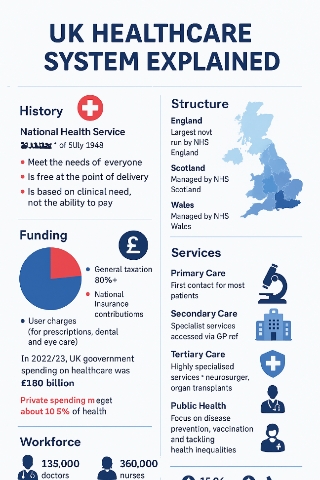UK Healthcare System Explained
The United Kingdom (UK) has one of the most renowned healthcare systems in the world. Known as the National Health Service (NHS), it is admired globally for its principle of providing healthcare that is free at the point of use. Since its inception in 1948, the NHS has become a central pillar of British society, symbolizing social solidarity and universal healthcare access. The UK healthcare system, however, is complex, combining public and private elements, decentralized administration, and evolving policies to meet modern challenges such as an ageing population, rising healthcare costs, and the demand for new technologies.
This detailed exploration will explain the UK healthcare system by examining its history, structure, funding, services, workforce, strengths, weaknesses, challenges, reforms, and future outlook. By the end, you will have a comprehensive understanding of how healthcare operates in the UK.
Historical Background of the UK Healthcare System
Pre-NHS Healthcare
Before 1948, healthcare in the UK was largely provided through a patchwork of voluntary hospitals, charities, municipal hospitals, and private doctors. Access was uneven:
- Wealthy individuals paid out-of-pocket for private treatment.
- Workers sometimes accessed healthcare through insurance schemes.
- The poor relied on charity hospitals or went without care.
The interwar years highlighted the need for a comprehensive system. The Beveridge Report of 1942 recommended sweeping social reforms, including universal healthcare.
Birth of the NHS (1948)
Health Secretary Aneurin Bevan launched the NHS on 5 July 1948 with the following core principles:
- It meets the needs of everyone.
- It is free at the point of delivery.
- It is based on clinical need, not the ability to pay.
The NHS was revolutionary—it made healthcare accessible to all UK residents, funded by taxation rather than individual payments.
Structure of the UK Healthcare System
The UK comprises four nations—England, Scotland, Wales, and Northern Ireland—each responsible for its healthcare system. Although the NHS was established as one system, devolution in the late 1990s gave each nation authority over health policies.
England
- Largest system, serving ~56 million people.
- Run by NHS England, which oversees Clinical Commissioning Groups (CCGs) and Integrated Care Systems (ICSs).
- Emphasis on patient choice, competition among providers, and use of private contractors for some services.
Scotland
- NHS Scotland manages health services centrally.
- Focus on collaboration rather than competition.
- Prescriptions are free.
Wales
- NHS Wales prioritizes community-based healthcare.
- No prescription charges.
- Less reliance on market mechanisms.
Northern Ireland
- Health and Social Care (HSC) system integrates healthcare and social care.
- Services remain under pressure due to political instability.
Funding of the UK Healthcare System
Sources of Funding
The NHS is primarily funded through:
- General taxation (main source, ~80%).
- National Insurance contributions.
- User charges for prescriptions (in England), dental services, and eye care.
NHS Budget
- In 2022/23, UK government spending on healthcare was around £180 billion.
- The NHS budget grows yearly but struggles to keep pace with rising demand.
Private Spending
- Private healthcare is available but small compared to the NHS (~10.5% of health expenditure).
- Many people rely on the NHS even if they have private insurance.
Service Delivery in the NHS
Primary Care
- First point of contact for most patients.
- Delivered mainly by General Practitioners (GPs).
- Services include diagnosis, treatment, referrals, prescriptions, and preventive care.
Secondary Care
- Specialist services provided in hospitals.
- Accessed via GP referrals.
- Includes surgery, maternity care, cardiology, oncology, etc.
Tertiary Care
- Highly specialized services such as neurosurgery, organ transplants, and advanced cancer treatments.
Public Health
- Focuses on disease prevention, vaccination, health education, and tackling inequalities.
- Public Health England (now replaced by UK Health Security Agency and Office for Health Improvement and Disparities) plays a central role.
Mental Health Services
- NHS provides psychological therapies, community mental health teams, and inpatient care.
- Increased investment in recent years but still underfunded compared to physical health.
Social Care
- Support for elderly, disabled, or vulnerable people.
- Funded separately from the NHS, largely through local councils.
- A key area of debate due to funding crises.
The Healthcare Workforce
Doctors
- Over 130,000 doctors work in the NHS.
- Includes GPs, hospital consultants, junior doctors, and specialists.
Nurses
- Around 300,000 nurses and midwives.
- Critical shortages in some areas, exacerbated by Brexit.
Allied Health Professionals
- Physiotherapists, radiographers, occupational therapists, and pharmacists.
International Staff
- Around 15% of NHS staff are non-British nationals.
- The NHS depends heavily on overseas workers, especially from the EU, India, and Africa.
Strengths of the UK Healthcare System
- Universal coverage – everyone has access regardless of income.
- Free at the point of use – most services cost nothing for patients.
- Strong primary care system – GPs coordinate patient journeys.
- Equity and fairness – healthcare based on need, not wealth.
- Cost efficiency – compared to the US, the NHS provides care at a lower cost per capita.
Weaknesses and Challenges
- Underfunding and rising demand – ageing population, chronic illnesses.
- Workforce shortages – especially nurses, GPs, and mental health staff.
- Waiting times – delays for GP appointments, hospital treatments, and A&E services.
- Social care crisis – fragmented funding and workforce issues.
- Health inequalities – disparities between regions and socioeconomic groups.
- Brexit impact – reduced recruitment of EU staff and medicine supply issues.
- Technology gaps – slow adoption of digital health innovations.
Reforms and Innovations
NHS Long Term Plan (2019–2029)
- Focus on prevention, community care, digital transformation, and personalized medicine.
Integrated Care Systems (ICSs)
- Aim to join up health and social care at local levels.
Digital Health
- Expansion of telemedicine, electronic health records, and AI in diagnostics.
COVID-19 Pandemic Impact
- Accelerated adoption of digital services.
- Highlighted resilience but also fragility of the system.
Private Healthcare in the UK
- Private healthcare operates alongside the NHS.
- Funded by out-of-pocket payments or private insurance.
- Offers faster access, choice of specialists, and luxury facilities.
- However, it remains supplementary; the majority of citizens rely on the NHS.
Comparison with Other Healthcare Systems
United States
- US relies heavily on private insurance, unlike the NHS.
- NHS is cheaper per capita and provides universal access, while the US has high costs and gaps in coverage.
Germany
- Germany has a social health insurance model.
- Citizens pay into statutory health insurance funds.
- Offers quicker access to some services but involves more bureaucracy.
Canada
- Like the NHS, Canada provides universal publicly funded healthcare.
- Both face challenges with wait times.
Future of the UK Healthcare System
Opportunities
- Digital transformation (AI, big data, robotics).
- Preventive healthcare focus.
- Personalized medicine and genomics.
Threats
- Financial sustainability.
- Workforce retention.
- Post-Brexit challenges.
- Rising public expectations.
Conclusion
The UK healthcare system, anchored by the NHS, is a model of universal, tax-funded healthcare. It has transformed public health, ensuring that millions receive care free at the point of need. While celebrated globally for equity and efficiency, the system faces significant challenges—underfunding, workforce shortages, and rising demand. To remain sustainable, the NHS must adapt with digital innovation, integrated care, and investment in both health and social care.
Despite its imperfections, the NHS embodies a powerful social contract: healthcare as a human right, not a privilege. For many, this makes it not only a healthcare system but a defining feature of British society.



